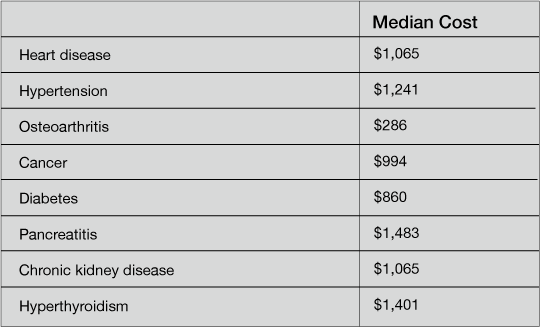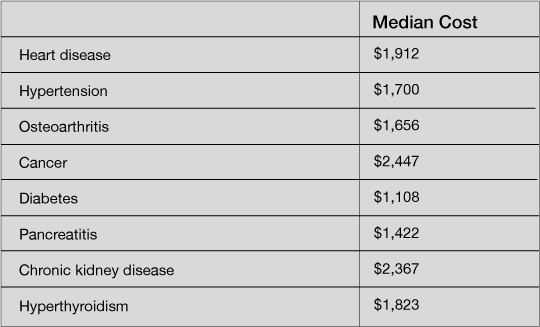
Obesity May Be Costing You Thousands (Even if You're Fit)
- Could you be feeding the newest obesity epidemic? Find out…
- Whoa doggy! Slow down on those treats. It might save your best friends life.
- Plus, a few easy tips to get your buddy slimmed down and keep your money in the bank!
Dear Living Well Daily Reader,
The obesity crisis is costing us billions in the U.S and worldwide.
And if you are a fit taxpayer, you may think it’s not costing you any more than your annual obligatory contribution to the national health care system.
But the things is you might be wrong. Obesity could be costing you thousands more every year — even if you’re fit as a fiddle!
So how is this possible? You’re in good shape, you eat right, you work out and get plenty of sleep. How could this be costing you a penny?
It’s simple —this obesity-driven bank drainer isn’t caused by your health habits. In fact, it has little to do with your body at all (well, except that you may be the hand that feeds it).
The good news is we have some easy tips to help you save some money and maybe even the life of your best friend. We will share these in a bit.
But first, let’s discuss how could this plague could be affecting you, even if you’re in great shape.
You see, the world’s obesity epidemic is long just a human problem — and it’s now ballooning over to our best friends.
Our pets.
![]() Diabetes: Not Just For Humans Anymore!
Diabetes: Not Just For Humans Anymore!
Recently, the Association for Pet Obesity Prevention (APOP) reported that 58 percent of cats and 54 percent of dogs in the U.S. are obese. Since 35.7 percent of American adults are obese, this means our four-legged friends are suffering from obesity at a greater rate than we are! 1,2
And while we might think our cute, cuddly, and slightly chubby pets may appear just as happy as leaner pets, the truth is they might actually be miserable.

When Josie first came to live with me, she weighed 23 lbs. These days, she’s down to 16 lbs!
According to Dr. Joe Bartges, academic director at Cornell University Veterinary Specialists and a member of the APOP, it can even reduce life expectancy and have negative impacts on your little buddy’s quality of life and lead to greater medical complications. He explains:
The reality is obesity kills. Numerous studies have linked obesity with Type 2 diabetes, osteoarthritis, high blood pressure, many forms of cancer, and decreased life expectancy. Our survey validates the notion that we’re seeing more obese pets with more potential medical problems.1
To back up Bartges’ statement, a recent U.K. study conducted by British pet insurer Animal Friends found that a diabetes diagnosis in pets has risen over 900 percent since 2011.
The study officially reports, “Whether this is to do with genetics or the lifestyles of these breeds and their owners is unknown.”
But it’s no stretch of the imagination to think obesity and inactivity likely played roles in this disease spike, just as in humans.
This rings particularly true when you consider one in five dogs doesn’t even get regular walks and a large number of cats are apartment- or housebound. 3
While there is no way to put an amount on the emotional suffering of losing your pet to a preventable disease, there are still the monetary costs to deal with. And let me tell you, it’s a lot more than an extra bag of treats!
![]() Don’t Let Those Extra Treats Break The Bank
Don’t Let Those Extra Treats Break The Bank
A 2009 study done by researchers at Michigan State veterinary hospital indicates that the annual cost for treating just one chronic condition in a pet can cost thousands.
This means if you have one or more obese pets or one pet has more than one chronic disease, your yearly bonus might be blown on insulin for your kitty or arthritis meds for your dog.
Here’s what your bank account could be facing:
Annual Veterinary Costs Associated With Canine Diseases
Source: dvm360.com
Annual Veterinary Costs Associated With Feline Diseases
Source: dvm360.com
It’s important to keep in mind that not all of these diseases are preventable by obesity reduction. However, getting the extra weight off your pet can lower their risk of acquiring a chronic disease.
So how can you get your pet back in shape?
Just like you do — with increased activity and a healthy diet.
Here are some tips to get you started:
- Make Time to ExerciseWalking your dog at a constant pace will help him lost weight. If your pup is too physically restricted to go on walks, try playing ball in the house or yard, even if it’s just for a few minutes a day. Once you get a routine, you will find it’s easier to increase the level of activity.If you have a cat and don’t think walking it is an option, you can always get your kitty moving with toys and lasers. Even large cats benefit greatly from a little playtime.And don’t forget, your animals weren’t designed to be housebound and fed from dishes. If you have a yard or outdoors space, hide some food in the grass and let your little buddy hunt for it. Not only is he working for his food, but he’s also getting a little added exercise.
- Consult Your Vet About Proper Food, Feeding Times, and Portion SizesJust like with human food, some choices are better than others. Be sure to consult your vet to find a food that will be most beneficial for your pet’s health. In addition, be sure you are feeding the proper amounts at the proper time.Unlike humans, most animals don’t get “full”. If your pet is given constantly given food, it will eat it. In my cat’s case, she had endless access to food. Because of this, she ended up weighing 23 pounds and experienced mobility problems. The vet is still baffled at how she didn’t have diabetes.Pet treats can be just as problematic. Some treats are full of processed ingredients and artificial colors and flavors. If your vet gives you the OK, sweet potatoes and carrots make excellent and worry-free pet treats.But most importantly, stop giving your pet table scraps. Humans eat some really weird stuff. Unfortunately, most of it’s bad for your best bud. So unless you have the go-ahead from your vet to feed your pet certain meats or vegetables, don’t give your furry friends anything from the table.
Live well,

Natalie Moore
Managing editor, Living Well Daily
P.S. Send me your pet health questions! Whether you have a cat, dog, bird, or any type of pet, I would love to hear from you. Direct all questions to nmoore@lfb.org
Sources
[2] Overweight and Obesity Statistics
[3] Cases of Diabetes in Cats and Dogs has risen over 900% since 2011
Written By Natalie Moore
Natalie Moore is a dedicated health researcher with a passion for finding healthy, natural, and science-based solutions. After a decade of direct healthcare experience in western and natural medicine, she was involved in public health research before joining Living Well Daily.
View More Free Articles
This Sleep Mistake Is Doubling Your Disease Risk
Think your inconsistent bedtime is just a harmless habit? Think again. New research reveals that going to bed at different times each night isn’t just making you tired—it could be dramatically increasing your risk of serious diseases. But the key to making sure poor sleep doesn’t derail your health goals likely isn’t what you think…....
Stop Obsessing Over Diet Trends
Can we stop with the endless diet debates already? Every other week there’s a new headline shouting about which diet is best for weight loss, heart health, or diabetes. Paleo, keto, low-carb, high-protein… it’s exhausting. And now, a new meta-analysis is out comparing the Mediterranean diet, the DASH diet, and something called AHEI (that’s “Alternative...
A New Reason to Ditch Processed Junk
If you’ve ever walked the inside aisles of your local grocery store and thought, “This is all just junk,” your instincts were spot on. A new study published in the journal Thorax just added another red flag to the list of dangers linked to ultra-processed food—a 41 percent higher risk of lung cancer. That’s right....
When Being Winded on Stairs Is Serious (And When It Isn’t)
I had an athlete visit me recently because he experienced shortness of breath while climbing stairs. He is in great shape, so he was worried about what it might mean. “Doc,” he said, “I run five miles three times a week. Why am I huffing and puffing after two flights of stairs?” His concern is...
Study EXPOSES Hidden Danger Lurking in Your Car
We think of our homes and cars as safe havens. But according to a startling new study, they may be flooding your lungs with microscopic plastic particles—every single day. Researchers in France recently found that adults inhale an average of 68,000 microplastic particles daily from indoor air alone. To put that in perspective, that’s about...
Mailbag: Is Modern Food Making You Snore?
“What can cause snoring, and is there a way to correct this issue?” —Seeking Silence Hi Seeking, Snoring happens when the soft tissues in your throat relax and vibrate as air passes through during sleep. While several factors can cause snoring—from sleep position to nasal congestion—I want to share one trigger that might surprise you....
Simple Food Swap SLASHES Dementia Risk 28%
Let’s be honest… who would jump at the chance to cut their dementia risk by 28 percent. And no, you don’t need to run marathons, survive on broccoli, or learn to play the zither (whatever that is) to make it happen. All it takes is one easy swap—something that’s probably already in your refrigerator. Researchers...
This SMART Floss Exposes Hidden Health Danger
Scientists have created dental floss that doesn’t just clean between your teeth—it also tracks your stress while you’re flossing. Now, I know what you’re thinking… “Great—now even flossing is going to stress me out by telling me how stressed I am.” But this fascinating new tool from Tufts University could be a game-changer for understanding...
Is This "Safe" Sweetener Damaging Your Brain?
The headlines are alarming… “Popular Sugar Substitute Linked to Brain Cell Damage” and “Erythritol Could Damage Critical Brain Barrier” are just two of the dozens I’ve spotted recently. But before you toss every sugar-free product in your pantry, let’s take a closer look at what this study actually shows—and what it doesn’t. The latest research...
This Summer Threat Could SPIKE Your Blood Sugar
Picture this… It’s another scorching hot summer day. You crank up the air conditioning while watching the weather forecast, which predicts yet another “record-breaking” heat wave. It’s starting to feel like just another miserably uncomfortable summer. But what you might not realize is that—if you have diabetes—those rising temps could do far more damage to...











